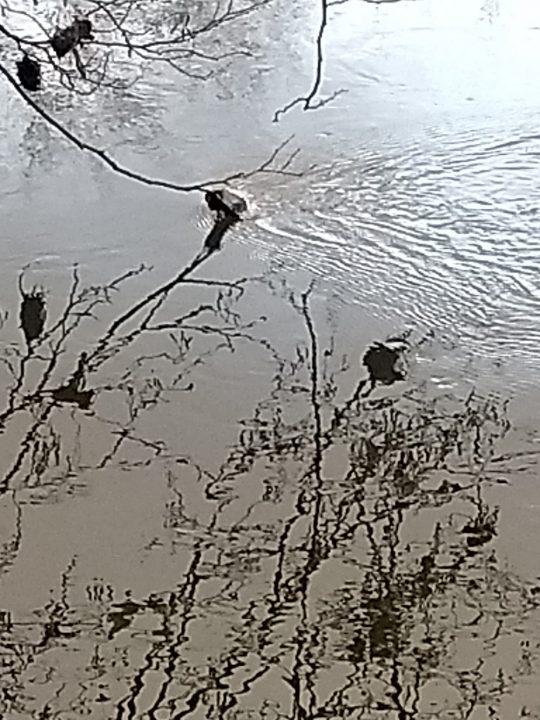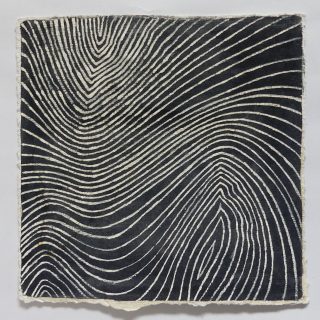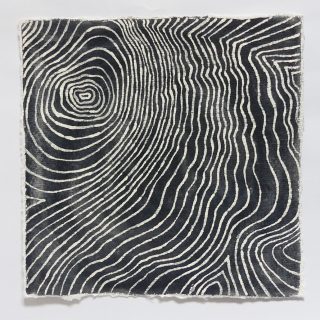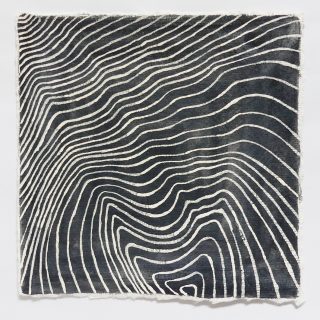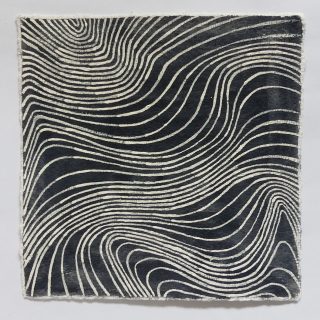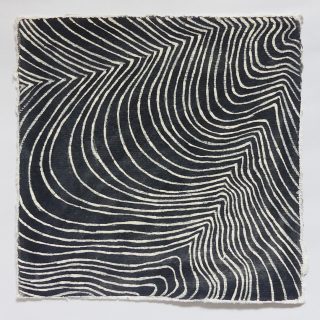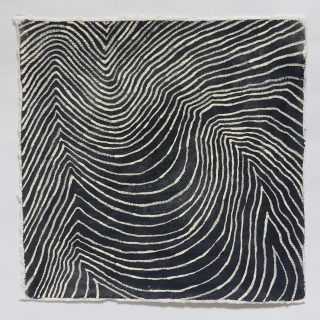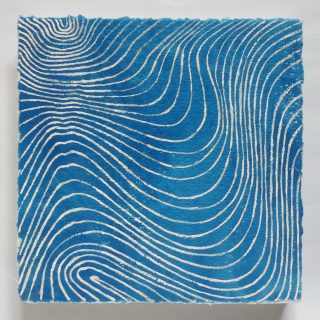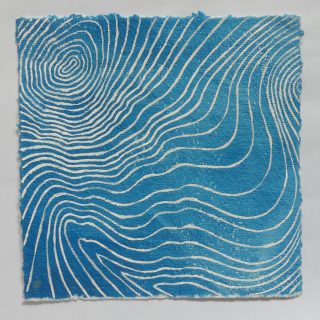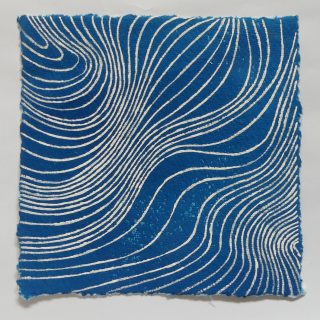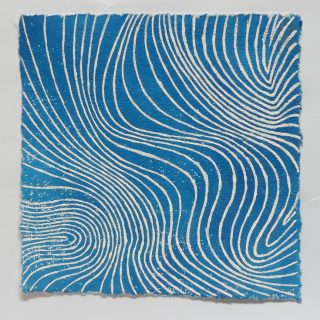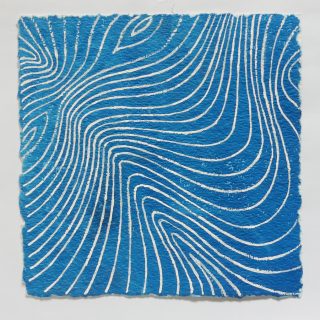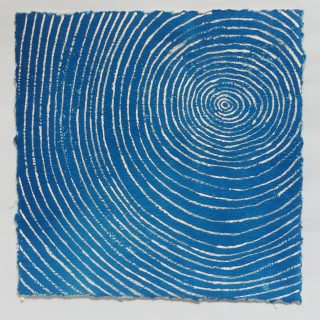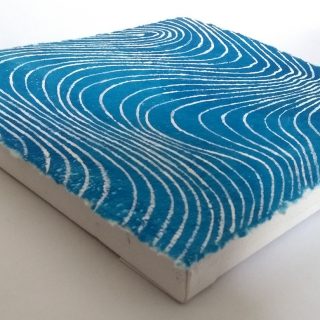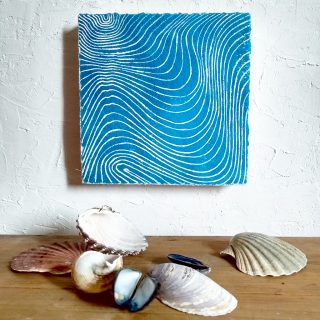Reading Water at St Nicholas’ Priory
12 March 2022
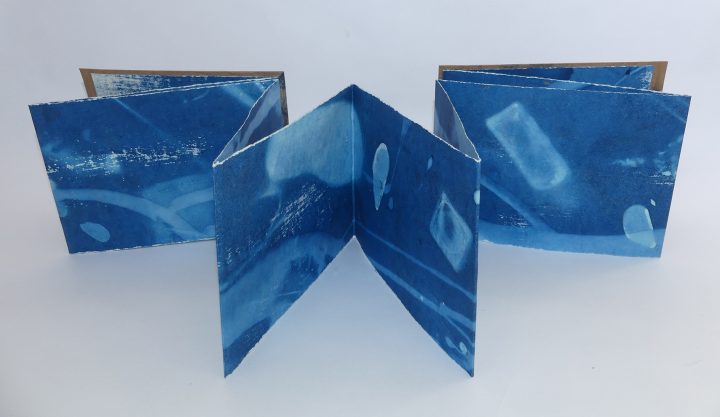
‘Reading Water’, mixed media, Naomi Hart 2021
I’m delighted to be able to show ‘Reading Water’ at St Nicholas Priory in Exeter. The Priory is Exeter’s oldest building and intrinsically linked with writing and learning, which seems a good fit for an exhibition about poetry and literature.
The final book will be shown alongside many of the objects which inspired me.
The exhibition will launch on Sunday 13th March from 1pm – 4pm and continue into June.
Sun, Oak, Ocean
21 May 2021
I’ve also been creating some new work, inspired by ‘Shell’.
Using the liquid chalk I developed for ‘Shell’, made from dissolved seashells and seawater, I’ve been painting on oakgall ink and cyanotype prints on recycled cottonrag paper.
21cm x 21cm, I’m selling these at £100 +p&p unmounted, or £120 +p&p mounted onto canvas stretchers. Any money from these will also go towards paying for my place on the Darwin200 expedition.
Darwin200
21 May 2021
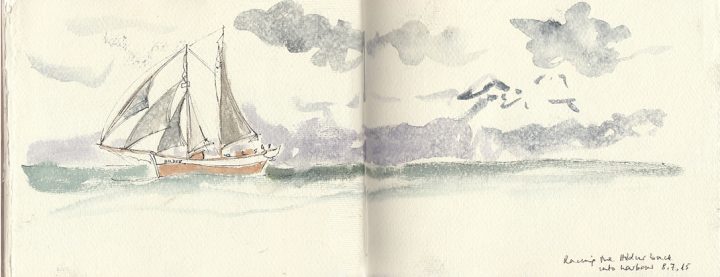 I’m very excited to announce that I’ll be taking part in the second leg of the Darwin200 UK expedition on the Tall Ship ‘Pelican of London‘ this summer.
I’m very excited to announce that I’ll be taking part in the second leg of the Darwin200 UK expedition on the Tall Ship ‘Pelican of London‘ this summer.
Darwin200 is an environmental conservation organisation working with young people to study some of the most important areas of marine science. I’ll be joining them as artist in residence as we sail from historic Glasgow docks through the Hebrides, St Kilda and round to the Isle of Skye, looking at cetacean and seabird surveys and ocean plastic pollution.
They have been consulting with my good friends at ExeterMarine about our work with ocean plastic and I’ll be carrying on some of the work we did and making new work about the journey.
Darwin200 have very generously sponsored 50% of my costs to join the expedition, but I’m raising the other 50% myself, so if you are able to donate to my fundraiser, I’d be very grateful. I do understand that these are difficult times for many of us, so please don’t feel obliged!
There’s a link here
Thank you for your support.
Trade & Exchange
19 February 2021
The project is led by Exeter Culture and involves Exeter City Council, the Devon and Exeter Institution, Liveable Exeter and is funded by the National Heritage Lottery Fund.
Because of lockdown, we are not quite sure of the dates, but hoping for early April.
I have previously worked with Dr Ceri Lewis in the Galapagos, so it’s lovely to continue our collaboration.
This event will be hosted by Sarah Campbell, Associate Director for Arts and Culture, University of Exeter (UoE)
The speakers will be:
- Naomi Hart, artist, and Dr Ceri Lewis, Associate Professor in Marine Biology (UoE)
- Emma Molony, artist, and Dr Rebecca Lovell, Research Fellow at the European Centre for Environment and Human Health (UoE)
Reading Water: making the book
20 January 2021
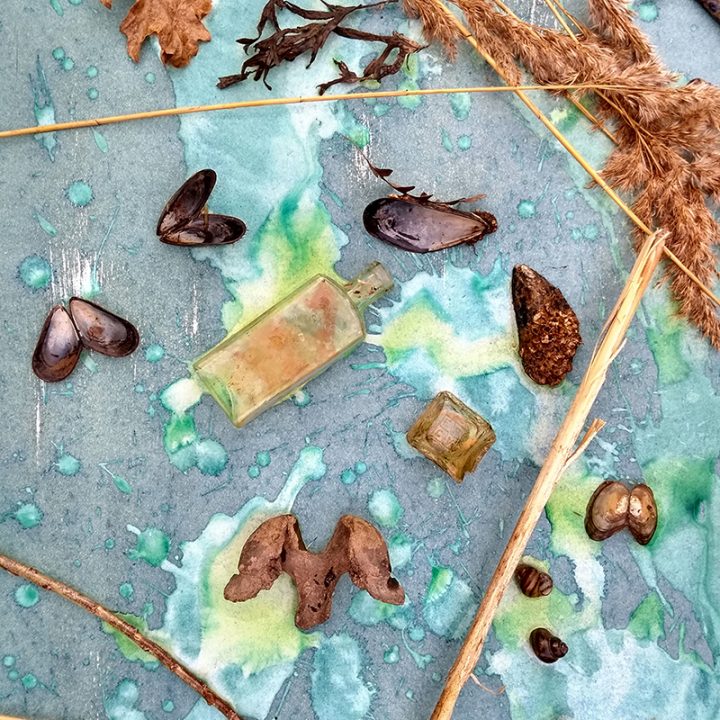
18 January 2021
After a few experiments with cyanotype and different kinds of paper, I discovered that the nicest colour came from a cheap roll of lining paper I had in my loft. In deepest winter, I struggled with finding enough high sunlight to expose the paper, but had fun laying out all my finds and quotes on the scroll.
Timing was arbitrary and unscientific, and many of the objects were invisible in the final prints – hidden again by time and tides.
The covers are tracings of a map of the Exe from Exeter to Topsham, flooded with oak gall ink.
As the river water is part of a great cycle of nature, the book has been made using re-purposed paper (lining paper, wrapping paper, paper salvaged from an office fire), home-made glue (wheat flour, water), home-made oak gall ink (including oak galls, rust, wine found in an Exe Valley nature reserve, wine vinegar and river water), ascorbic acid (lemon juice), mud from the Exe, natural chalk and cyanotype using river water.
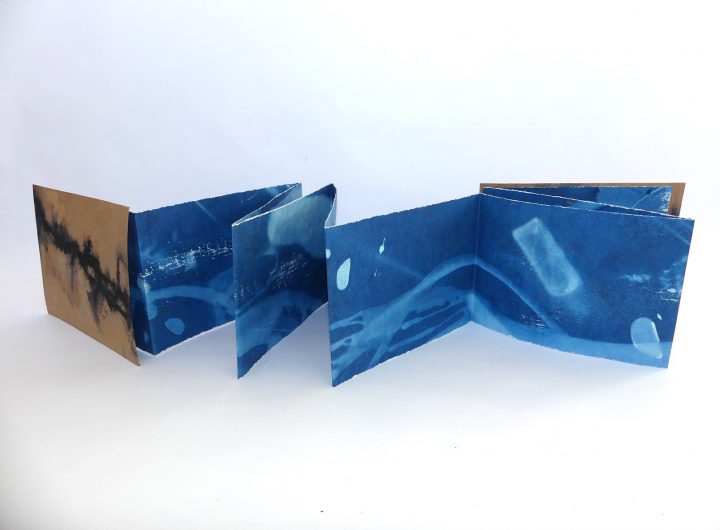
‘Reading Water’, mixed media, Naomi Hart 2021
Reading Water: mud and mussels
14 January 2021
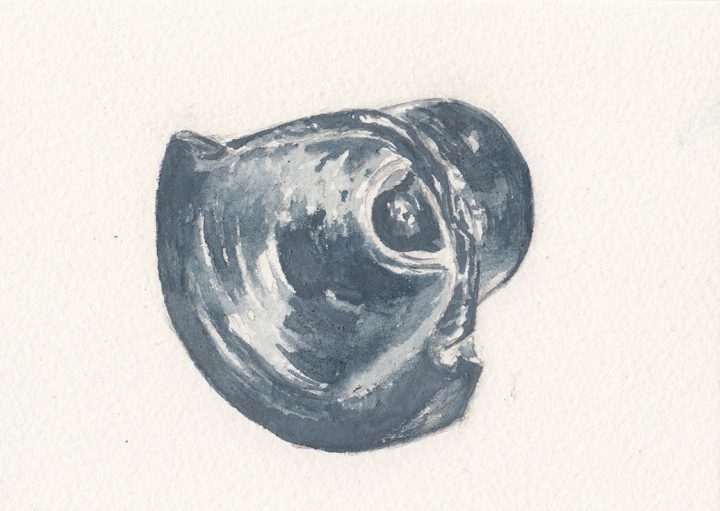
Thursday 14th January 2021
I parked by the boatyard, as it seemed there was a way to join the tidal path which ran from Topsham up through the reedbeds, but was told very clearly that the boatyard was ‘completely closed’. After a few minutes chatting, the owner relaxed a little and explained how to get to the beginning of the path, through a little gate just up on the road behind us. He also admitted, that in 20 years of living by the river, he had never walked up the path beyond the M5 flyover, suggesting it was ‘very muddy’. I told him that was why I was there, and we parted, wishing each other a lovely day. I found the little gate but still had to walk the best part of a mile to access the river, which I found strange for all the houses that I passed – so close and yet so cut off.
I got down to the water at the ‘Rec’, or recreation ground, which always makes me think of a ship’wreck’. I wanted to do some mudprinting, but figured it would be best at the end of the walk, when I could take things home to dry, so instead I studied the foreshore and was rewarded with most of a bottle, then another, then a whole one. Clearly this was some kind of bottle dump, and they were just lying there, being uncovered by the tides.
I hadn’t really come prepared for a large amount of fragile finds, so padded them out in my rucksack as best I could and headed upstream, past dilapidated jetties and smart garden gates. The reeds were tall and swayed back and forth in the breeze, the sunlight turning this cold winter expedition into a summer stroll. I reached the boatyard from the other side, slightly annoyed that it had taken me about an hour to get back to where I started, but realising this was part of the story – how we are cut off from nature by planning and private ownership, and wondering how we can change this. The hulk of the M5 bridge loomed over me – the single reason I would not want to live here, with its constant roar of traffic. Beyond this I was into fenland wilds of giant reeds, flooded paths and a feeling of being what the French call ‘dépaysée’ – ‘feeling not at home, disoriented’, but literally ‘uncountried’. This can be negative, but today just felt like that feeling you get on holiday of all things new, and strange and wonderful.
My bad decision on parking meant that I would have to walk all the way back along the front, or a mile or two along the busy Topsham road, so I took the more scenic route and headed back the way I’d come. At the boatyard I spied a few mussel shells, which I have been collecting for another project, so I bent down to pick some up, and realised that there were literally hundreds of empty, unpecked-by-birds mussel shells of all sizes, from no bigger than my little finger nail, just at one spot.
‘… and I filled
A big handkerchief with blue
Mussels.’
(‘Mussel Hunter at Rock Harbour – Sylvia Plath)
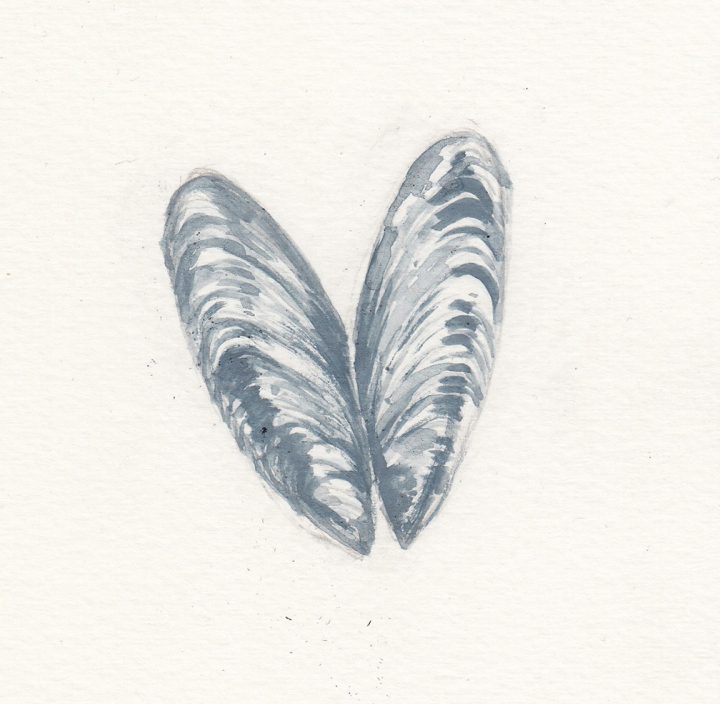
Mussels are grown in the Exe, and there are large beds of them further downstream.
I did some very windy mud-printing, and set off, with large, wet rolls of paper to get back to the car. The little gate was firmly locked, with a number keypad and a sign, only visible from this side, that this 5 metre stretch of lane was very definitely private. I backtracked and wound my way for about a mile through the estate, out onto the busy main road, tired, cold and with aching feet back to my car.
Reading Water: ink
7 January 2021
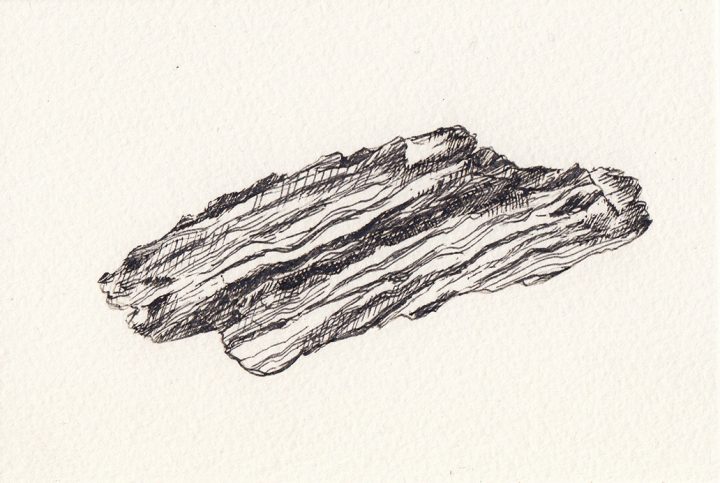 7th January 2021
7th January 2021
The banks of the Exe are lined with oaks, both majestic and tiny, and I am constantly finding acorns, of all sizes, newly fallen or blackened from years in the river’s mud. Robert Macfarlane and Jackie Morris include acorns in their ‘Lost Words’ spell book of poems and illustrations. Some of the acorns have galls from different species of wasp; I make oak gall ink for the first time and am so excited when it works.
It makes me think of a poem by Bruce Bond, called ‘Ink’ about the sacking of the library of Baghdad:
‘When, in the dark ages of the East,
the Mongols took the heart of the city
and poured in, room after room…
they loaded up the illuminated books,
the many wildflowers of Islam hand-sewn,
penned, edged in gold…’
‘…once a library fell into the Tigris,
and these waters, that are a widow’s friend,
ran black with ink, mile after mile.”
(‘Ink’ – Bruce Bond)
The Cathedral and St Nicholas’ Priory, among other places, would have had scholars scribing manuscripts in oak gall ink on vellum and decorating them with gold. The river is a conduit for learning, bringing in new ideas from all over the world.
Reading Water: life and death
31 December 2020
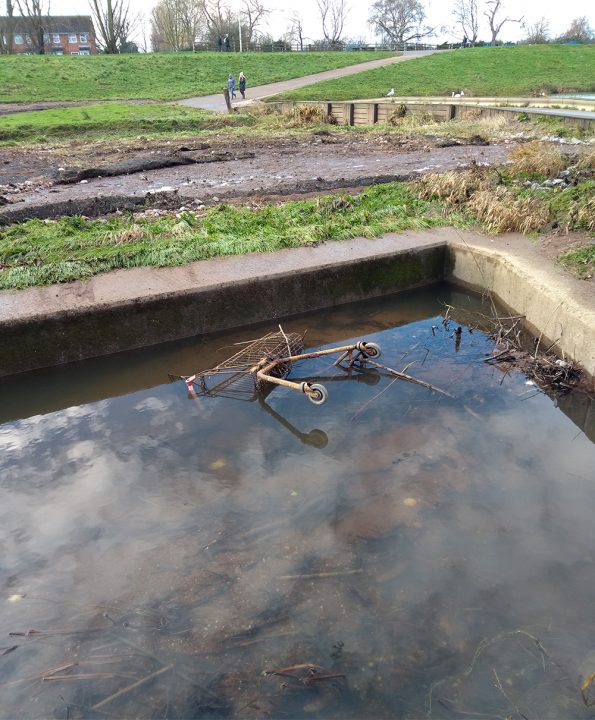
31st December
I tend to try and focus on the beautiful aspects of the river, especially as an escape from daily worries, and the sight of the resident kingfisher, with its blue-green-gold flash, is always cheering, but there are constant signs of our neglect of nature around, too.
Valerie Bloom’s wonderful rhythmic poem ‘I asked the river’ pulls us in to a bubbly conversation with a river, only to end with a damning rebuke for how we should treat the environment better. Walks along the city section of the Exe certainly features rather too many traffic cones and shopping trolleys, not to mention the invisible microplastics that are omnipresent in our ecosystems now.
‘Why don’t you fight for your life?’ I asked,
‘You only foam and seethe.’
‘My lungs are clogged,’ the river moaned,
‘And I can hardly breathe.’
‘Perhaps a rest,’ I told the river,
‘Would help to clear your head.’
‘I cannot rest,’ the river said,
‘There’s garbage in my bed.’
(‘I asked the River’ – Valerie Bloom)
I saw tiny minnows in the flood relief channel, skittering in a little cloud when I moved or the light changed. On occasion I have been lucky enough to look down on the water from one of the footbridges and see salmon leaping and think of the tremendous journeys they make from river to sea and back again to spawn. Walking along the shores of the Exe, I have found small private gated areas ‘Private fishing’ and signs telling me in several languages that I am not allowed to fish. I’ve never quite understood hobby fishing, as opposed to fishing to eat, but probably it’s like my need to take my sketchbook and just sit in a lovely place for hours.
Apparently the Exe has ‘wild brown trout , and in the lower reaches coarse fish including dace, chub, perch, roach, pike and bream and some grayling, the average size being 8–10 ounces (230–280 g). There is a run of Atlantic salmon and a sparse run of sea trout.’
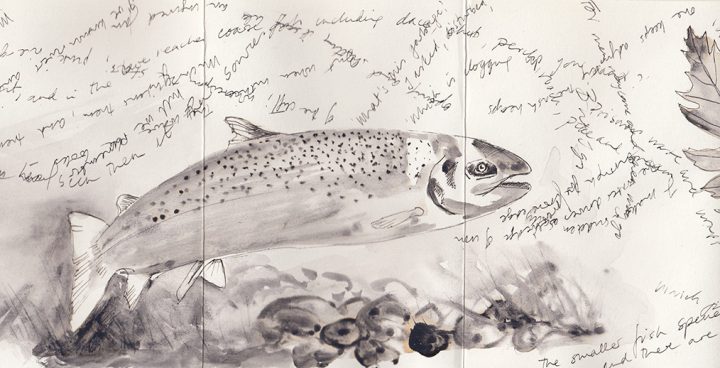
Christian Schubart tells a tale of watching a fisherman in a battle of wits with a trout. The poem was perhaps made famous by being set to music by Franz Shubert:
‘So lang dem Wasser Helle,
So dacht ich, nicht gebricht,
So fängt er die Forelle
Mit seiner Angel nicht.’
(As long as the water
is clear, I thought,
he won’t catch the trout
with his rod.)
(‘Die Forelle’ (The Trout) – Christian Schubart)
Translations are clunky, and can very rarely retain all the multiple meanings and grace of the original. Languages contain whole cultures and different ways of thinking, and I am reminded how wonderful it is to have people from so many cultures who call the Exe Estuary their home.
‘My hometown, like the stars just blinking on,
Is somewhere on the other side of a wide, wide river’
Reading Water: ships, wars, trade, slaves
7 December 2020
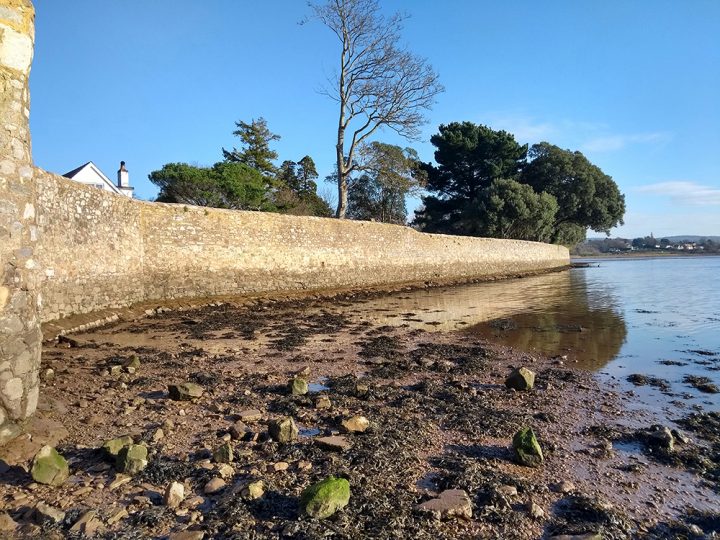
6 December 2020
Behind the wall at Riversmeet, the sun warm on my face, protected from the wind, I print the mud, we watch a heron and an egret, closer than I have ever seen them, stock still at the water’s edge, then stepping, purposefully to gain a new perspective. We hunt for ancient treasure: bottle, military buttons, pottery from ages past.
Topsham was once the second largest port after London and an important shipbuilding town.
Standing in the warm sunshine at Riversmeet House, where the Exe meets the Clyst, staring out to the sea in the distance; in Emily Dickinson’s words in ‘My river runs to thee’, ‘Say, sea, Take me!’ I feel the real desire to swim, but this isn’t a good place.
Making our way upriver along the foreshore, past the Dutch houses and former shipyards, I think of one of my favourite childhood poems, so wonderful to recite:
‘Quinquireme of Ninevah from distant Ophir,
Rowing home to haven in sunny Palestine,
With a cargo of ivory
And apes and peacocks,
Sandalwood, cedarwood and sweet white wine.’
Each verse is steadily less romantic and more grubbily realistic, but it’s incredibly visually rich, and has such wonderful rhythm that I never tire of it.
Riversmeet was built by one of the major shipbuilders and I stand and imagine the great wooden bombships heading in the once-deep channel to the sea. One of these ships was present at the battle of Fort McHenry in America during the 1812-1815 war, and a poem was written about the battle. That poem became the American National Anthem, linking the small town of Topsham with one of the great events of American history.
‘And the rocket’s red glare, the bombs bursting in air,
Gave proof through the night that our flag was still there;
O say does that star-spangled banner yet wave
O’er the land of the free and the home of the brave?’
(‘Star-spangled Banner’ – Francis Scott Key)
The shipbuilder’s family (Davy) was also deeply involved in the slave trade, as were many families in Devon, and we are reminded how rivers, tides and ocean currents connect us with the world and how they have been integral in how trade routes developed. In ‘The Negro speaks of Rivers’, Langston Hughes names rivers which embody human history, particularly Black History.
I once kayaked downriver into a side channel, overgrown with willows and reeds, it felt like Florida swampland, and we like intrepid explorers. On those days the river is all rivers and all stories.
‘I’ve know rivers ancient as the world and older than the flow of human blood in human veins.’
Reading Water: fragility
2 December 2020
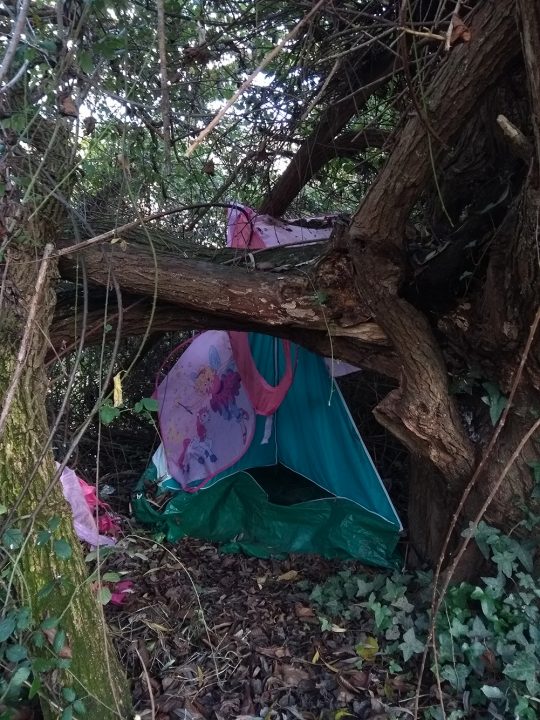 2 December 2020
2 December 2020
I headed upstream a little, towards the railway. Here the river and flood defence channel swing round the city in an arc. St Thomas traditionally used to flood every few decades and still comes perilously close sometimes. New walls are being built to contain the floodwaters. In the trees between the river and the flood channel I find tents, battered by recent storms, the childish colours are jarring in the dark woods. This was someone’s home, however fragile it appears. Now ripped and waterlogged, someone has yet again had to move on.
‘You go because hope, need and escape
are names for the same god. You go because life
is sweet, life is cheap, life is flux
and you can’t take it with you. You go because you’re alive,
because you’re dying, maybe dead already. You go because you must.’
(‘Time to Fly’ (from the Mara Crossing) – Ruth Padel )
Up by the railway bridge, deep in the undergrowth, I find a small pile of glass bottles someone has dug out of the earth. Often in the past bottles were thrown into dumps, and building work, like the railway, or the flood defence wall, bring them up into the light again. Most are broken, but some are whole, from all different eras. They would have contained medicine, food, drinks, superseded nowadays by plastic and aluminium cans.
‘Into the stream I flung
A bottle of clear glass
That twirled and tossed and spun
In the water’s race
Flashing the morning sun.’
(‘The River’ – Kathleen Jessie Raine)
The river is silvery, calm, running like glass down to the weir.
